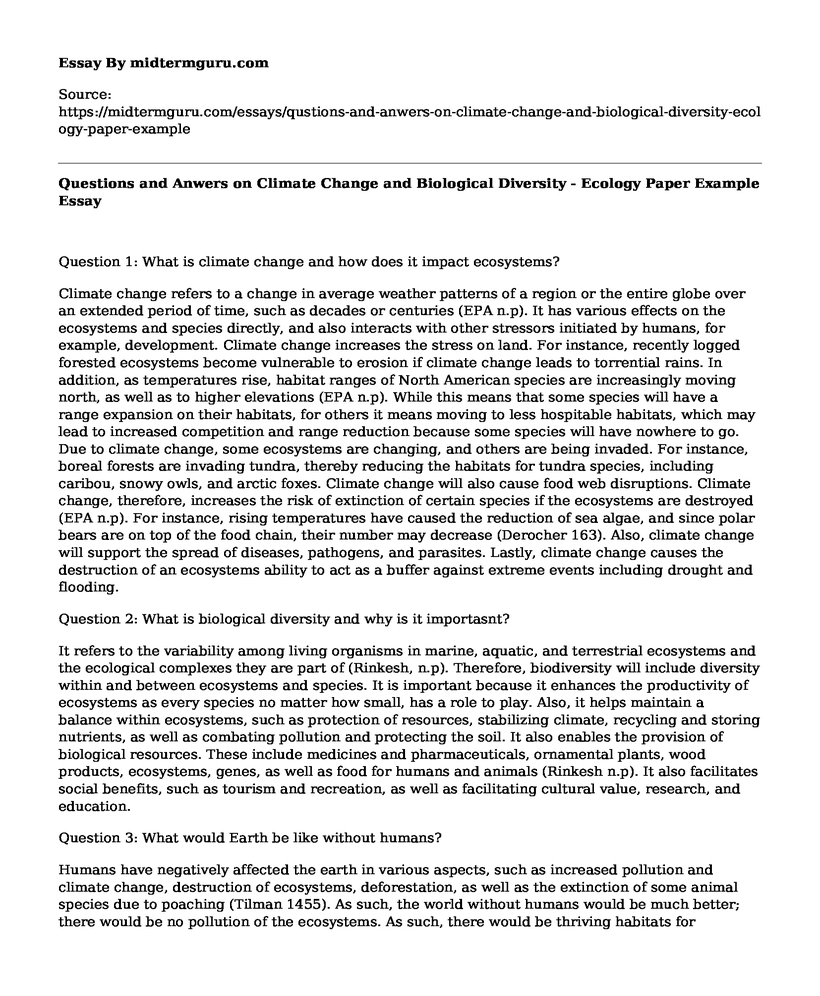Question 1: What is climate change and how does it impact ecosystems?
Climate change refers to a change in average weather patterns of a region or the entire globe over an extended period of time, such as decades or centuries (EPA n.p). It has various effects on the ecosystems and species directly, and also interacts with other stressors initiated by humans, for example, development. Climate change increases the stress on land. For instance, recently logged forested ecosystems become vulnerable to erosion if climate change leads to torrential rains. In addition, as temperatures rise, habitat ranges of North American species are increasingly moving north, as well as to higher elevations (EPA n.p). While this means that some species will have a range expansion on their habitats, for others it means moving to less hospitable habitats, which may lead to increased competition and range reduction because some species will have nowhere to go. Due to climate change, some ecosystems are changing, and others are being invaded. For instance, boreal forests are invading tundra, thereby reducing the habitats for tundra species, including caribou, snowy owls, and arctic foxes. Climate change will also cause food web disruptions. Climate change, therefore, increases the risk of extinction of certain species if the ecosystems are destroyed (EPA n.p). For instance, rising temperatures have caused the reduction of sea algae, and since polar bears are on top of the food chain, their number may decrease (Derocher 163). Also, climate change will support the spread of diseases, pathogens, and parasites. Lastly, climate change causes the destruction of an ecosystems ability to act as a buffer against extreme events including drought and flooding.
Question 2: What is biological diversity and why is it importasnt?
It refers to the variability among living organisms in marine, aquatic, and terrestrial ecosystems and the ecological complexes they are part of (Rinkesh, n.p). Therefore, biodiversity will include diversity within and between ecosystems and species. It is important because it enhances the productivity of ecosystems as every species no matter how small, has a role to play. Also, it helps maintain a balance within ecosystems, such as protection of resources, stabilizing climate, recycling and storing nutrients, as well as combating pollution and protecting the soil. It also enables the provision of biological resources. These include medicines and pharmaceuticals, ornamental plants, wood products, ecosystems, genes, as well as food for humans and animals (Rinkesh n.p). It also facilitates social benefits, such as tourism and recreation, as well as facilitating cultural value, research, and education.
Question 3: What would Earth be like without humans?
Humans have negatively affected the earth in various aspects, such as increased pollution and climate change, destruction of ecosystems, deforestation, as well as the extinction of some animal species due to poaching (Tilman 1455). As such, the world without humans would be much better; there would be no pollution of the ecosystems. As such, there would be thriving habitats for numerous of species. The environment would be cleaner and greener. There would be no erosion, and the air would be cleaner. In addition, there would be more forest cover. There would be species endangerment and global warming coupled with climate change would never occur. Furthermore, ecosystems would not invade others, and thus, habitats would not be decreased.
Works Cited
Derocher, Andrew E., Nicholas J. Lunn, and Ian Stirling. "Polar bears in a warming climate." Integrative and Comparative Biology 44.2 (2004): 163-176. Print.
Rinkesh. What is Biodiversity? n.d. Web. 1 Mar, 2017.
Tilman, David. "The ecological consequences of changes in biodiversity: a search for general principles." Ecology 80.5 (1999): 1455-1474. Print.
United States Environmental Protection Agency (EPA). Climate Impacts on Ecosystems. N.d. Web. 1 Mar, 2017.
Cite this page
Questions and Anwers on Climate Change and Biological Diversity - Ecology Paper Example. (2021, Jun 07). Retrieved from https://midtermguru.com/essays/qustions-and-anwers-on-climate-change-and-biological-diversity-ecology-paper-example
If you are the original author of this essay and no longer wish to have it published on the midtermguru.com website, please click below to request its removal:
- To Frack or Not to Frack - Ecology Essay Sample
- Paper Example on Sea Erosion
- Zero Waste Bulgaria - Essay Sample
- Carlton Watkins: Instrumental in Advocating for Environmentalism - Essay Sample
- Article Analysis Essay on "What Is Global Warming, Explained" by Christina Nunez
- Power Plant Developments in US - Impacts on Society & Environment - Essay Sample
- Humans, Bacteria and Darwin: The Wry Fate of Galapagos - Essay Sample







